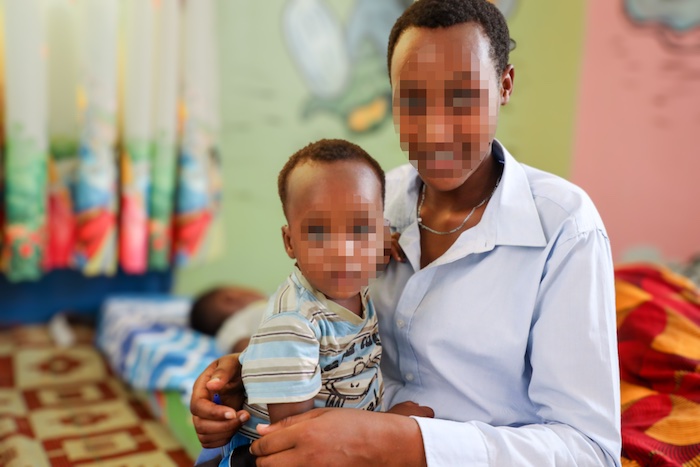
Anne, an 18-year-old mother, and her 2-year-old daughter are at Save the Children Daycare in Mahama Camp. © UNHCR/Lilly Carlisle
By Lissa Mugire
Anne*, 18, a Congolese refugee living in the Mahama camp in Rwanda, embodies the resilience of displaced young mothers when life gets tough.
Anne’s arduous journey began in 2012 when, at the tender age of six, she fled the turmoil of the Democratic Republic of Congo (DRC) with her family, seeking safety in Rwanda.
After settling into a refugee camp, Anne began a new chapter in her life. Despite the challenges that surrounded her, she was eager to learn and grow, so she started attending school. However, life turned upside down when she found out she was pregnant at fifteen.
“It is tough being in the camp and being a mother,” Anne confides. “When I gave birth, I stopped coming to school.”
Initially met with apprehension and disappointment from her parents, Anne’s journey turned towards understanding and support. Her parents, realizing the gravity of the situation, adopted the perspective of learning from experience. They became her pillars of strength, offering care and assistance as she navigated the challenges of teenage motherhood.
After giving birth, Anne returned to school six months later where she found solace and support through Save the Children’s daycare program. The program acted as a lifeline that enabled her to continue her education without worrying about the well-being of her daughter, Jane.
“Often teenage mothers like me drop out of school. This is because often they do not have the time to be in school when they must spend it working, looking for food, or looking after the child” says Anne.
“Raising a child in a camp is difficult,” Anne reflects, “but it also fuels my motivation to strive for a better future.”
Despite her challenges, Anne remains steadfast in her pursuit of education. Currently in S3, she dreams of a future where she can continue her studies in mathematics, physics, and geography.
While her initial dream of becoming a doctor shifted due to practical considerations, she remains determined to carve out a brighter path for herself and her daughter.
“One of my wishes is to learn how to drive a car,” Anne shares with a smile, her eyes alight with possibility.
Despite facing mixed reactions from friends, Anne found solace in the support of loyal friends who acknowledged her struggles. Her daily routine exemplifies resilience: walking to breastfeed her daughter during school breaks and juggling motherhood with academic aspirations.
Monday to Friday, Anne diligently takes Jane to daycare while she attends school, a routine that embodies her unwavering dedication to both her education and her daughter’s well-being.
Anne’s story is not a personal struggle but about a larger issue: the prevalence of teenage pregnancy in refugee camps. Her advice to others her age is simple yet profound: “Stay in school, because school saves you from bad behaviors. The school also helps you deal with financial troubles by helping you find a job in the future.
Looking towards the future, Anne hopes for greater access to reproductive health education within the camp, recognizing the importance of empowering teenagers with the knowledge and resources they need to make informed choices about their bodies and futures.
UNHCR and its partners Save the Children International (SCI), Plan International Rwanda (PIR) and ALIGHT are currently implementing several child protection and gender-based violence prevention programs such as Adolescent Sexual & Reproductive Health (ASRH) education, SASA! Approach, Champions of Change curriculum (CoC), Parenting under Pressure, Better Life Options and Opportunities Module (BLOOM), and sports and recreational activities. These programs are carried out through awareness-raising campaigns in the refugee communities, door-to-door approaches, one-on-one sessions, and different sports/recreational activities. (End).
*Name changed for protection purposes(Source : UNHCR Rwanda)
